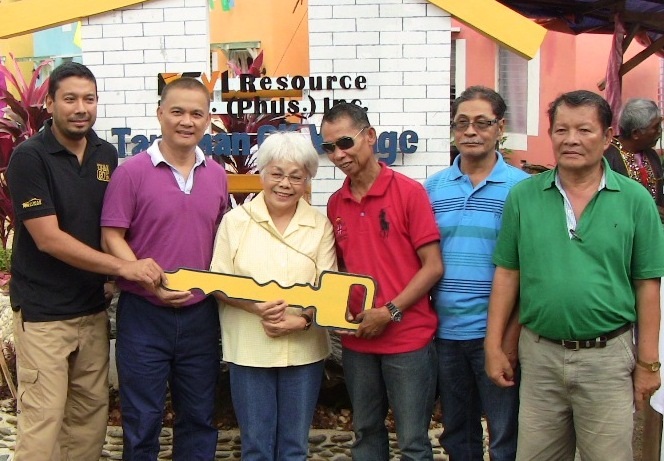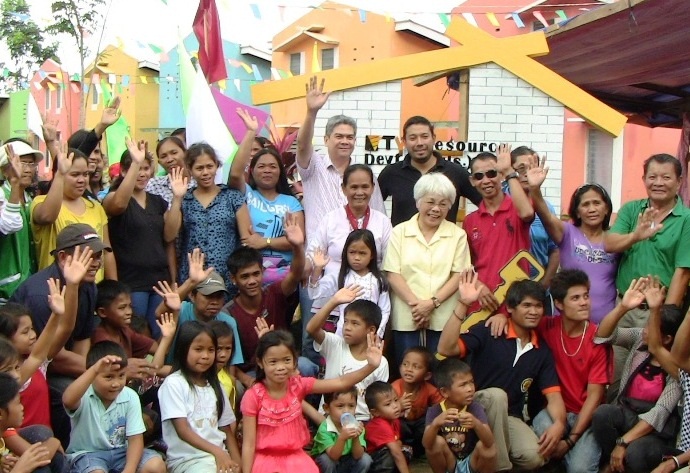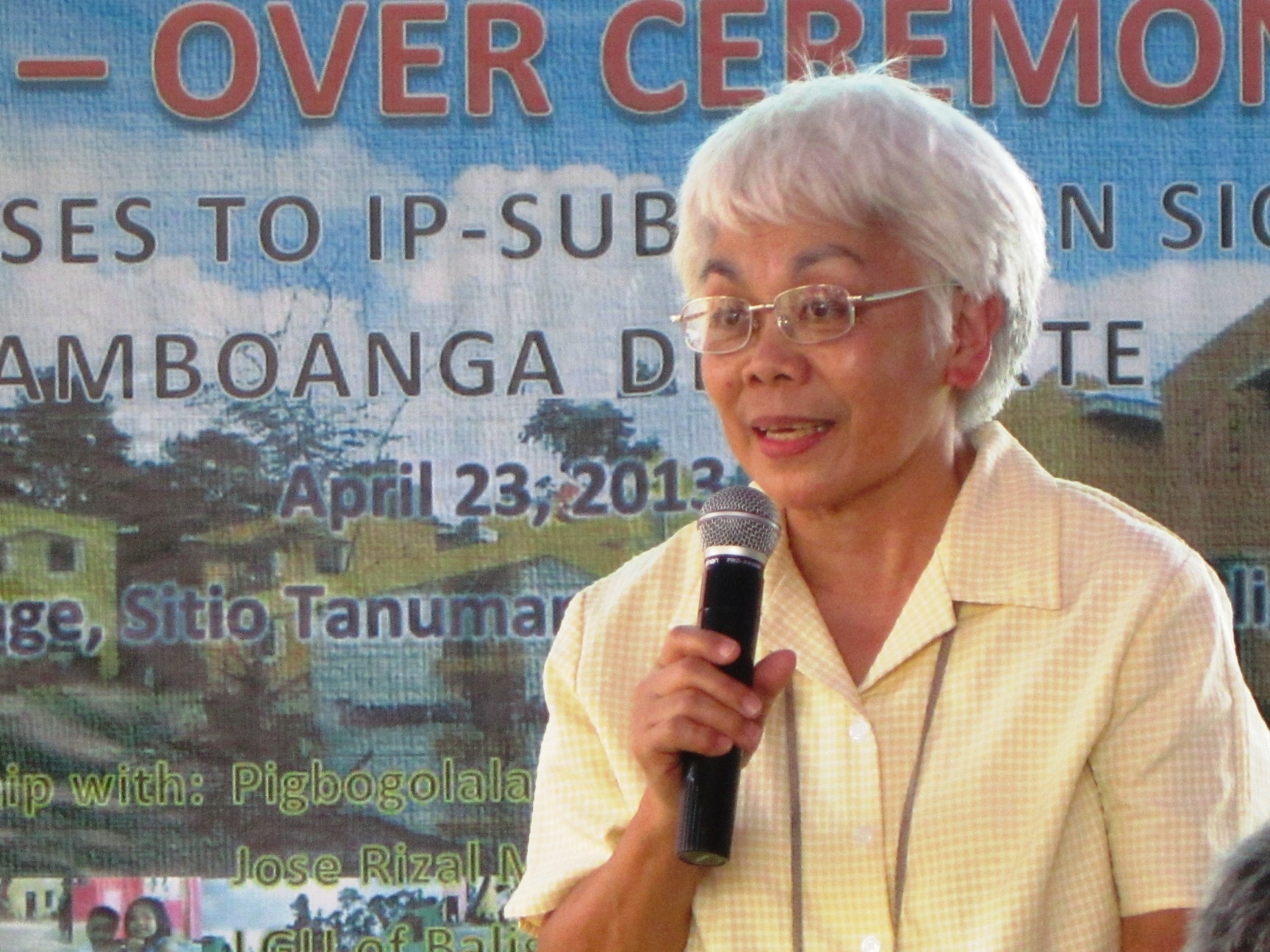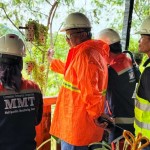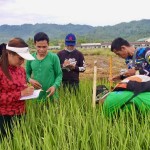-
NCIP Chairman Zenaida H. Pawid turns-over the ceremonial key to the first 40 houses to Kapitbahayan President Celestino Guingaag at the TVIRD-GK Tanuman Village inauguration. With them are (from L to R) GK President Luis Oquiñena, TVIRD COO Yulo Perez, Subanon Chief Jose Anoy and Baliguian Mayor Gani Esmali.
-
“Manang Briggs,” mabuhay po kayo! Subanon beneficiaries and newly-conferred homeowners welcome NICP Chairman Zenaida Pawid at the TVIRD-GK Tanuman Village.
-
Keynote message. NICP Chairman Zenaida Pawid stresses the need for compassion within every community during her keynote speech at the recent at the TVIRD-GK Tanuman Village turnover ceremony.
TVIRD, GK turnover first 40 houses to Subanon homeowners in mine site
Baliguian, Zamboanga del Norte / April 2013 – National Commission on Indigenous People (NCIP) Chairman Zenaida H. Pawid demonstrated her support and approval of the TVIRD-GK Tanuman Village, a community established by TVI Resource Development Philippines Inc. (TVIRD) for Subanon beneficiaries in Baliguian, Zamboanga del Norte. Along with key officers of the company and Gawad Kalinga (GK), Chairman Pawid officiated the ceremonial turnover of the first 40 out of a planned 100 houses to the new homeowners. The village is located within the 8,263-hectare Subanon ancestral domain, which spans the municipalities of Siocon and Baliguian. It is also adjacent to TVIRD’s 508-hectare Mineral Production Sharing Agreement (MPSA) area and current mine site. The tribe is the sole recipient of royalties coming from TVIRD’s mining operations.
“Itong mga bahay na ito, mga bahay lang. Semento lang. Ang importante ay ang mga taong naninirahan sa loob nito. Gawin natin itong tutuong mga tahanan – may kalinga sa bawat isa, isang komunidad na may malasakit sa kapwa (These are mere houses, structures that are made of cement. What is important is the people who are living in these houses. Let us turn these houses into real homes – where people care for each other, a community of people who care for one another),” Chairman Pawid told Subanon homeowners in Filipino during the turnover.
Hon. Zenaida Brigida H. Pawid chairs the NCIP, the Philippine government’s commission tasked to protect and promote the interest and well-being of the country’s indigenous cultural communities. It is also mandated to uphold the beliefs, customs, traditions and institutions of Filipino indigenous people.
Prior to her appointment as head of the NCIP, Pawid was the Commissioner of the Cordillera People’s Alliance and was involved in the Social Reform Agenda – a forerunner of Republic Act 8371 or the Indigeneous People’s Rights, which created the NCIP. Pawid was also a member of the government peace panel that negotiated with the National Democratic Front during the Ramos administration, earning her a Nobel Peace Prize nomination.
Mine tour and dialogue with the Subanons
Chairman Pawid toured TVIRD’s mine facilities, including the 28-storey high sulphide tailings impoundment dam, which she considered “fantastic.” The dam stores the tailings that come from the processing plant as well as silts and run-off water from the mine pit and gulleys. TVIRD’s sulphide dam is built to contain 4.6 million cubic meters of water and withstand a tremendous amount of rainfall and seismic activity.
“Daily rainfall data has been collected since 2003 and the maximum 24-hour rainfall for the succeeding ten-year period was 166 millimeters. The rainfall depth of a 24-hour period during Lawin’s downpour last September 23 to 24 was 227 millimeters or just 13% of the maximum rainfall depth the Sulphide dam can endure in 24 hours,” said Environment and Civil Works Vice President Engr. Jay Nelson, explaining the dam’s design, stability and how it protects the quality of water that flow towards Siocon town.
The Chairman was also brought to one of TVIRD’s nurseries where several seedlings of indigenous trees and other species are grown for the reforestation and revegetation of affected areas.
“Natuto na ang kompaniya, natuto na din ang mga Subanons (The company has learned and so have the Subanons),” commented Chairman Pawid during her interaction with the company’s Subanon employees and exposure to several programs and projects of the company for its indigenous hosts and members of the community.
In the spirit of heroic brotherhood
TVIRD spearheaded the establishment of the Tanuman community primarily to improve the living conditions of Subanons residing within the proximity of its mining area, and in line with provisions set in its Environmental Compliance Certificate (ECC). Prior to building Tanuman Village, the company has erected school buildings, health facilities and other infrastructure as well as provided livelihood for its indigenous hosts, who have directly benefitted from over Php330 million in royalties and Social Development and Management Programs (SDMP).
The Subanons themselves built the houses in the spirit of Bayanihan and values instilled by GK as part of its engagement to build communities, which dovetails with TVIRD’s corporate thrust of safeguarding the inalienable rights and sustainable development of its host communities.
“There will be challenges along the way since the GK way is a long process. The transformation is not overnight (and) building houses together is just the first step,” according to Gawad Kalinga Executive Director Jose Luis M. Oquiñena. “We had new discoveries during the process. We met new friends (and) we respect each other,” he said.
Subanons who are now rightful owners of their new homes contributed some 500 hours of work in building their neighbors’ houses. Each beneficiary family is entitled to a 30-square meter, single detached unit equipped with electricity, sufficient plumbing and other modern conveniences.
Addressing poverty
Department of Social Welfare and Development (DSWD) Regional Director Teodulo Romo previously disclosed that 65 percent of the households in Zamboanga del Norte fall within the poverty threshold. The province is also listed by the National Statistical Coordination Board (NSCB) as one of the poorest provinces in the country until 2011
TVIRD’s host municipality of Siocon was not in the list, having been elevated to first-class status from being a 4th class municipality prior to the company’s large-scale mine operations and subsequent benefits to downstream industries. The municipal upgrade three years ago also comes as a result of tax revenues and the company’s establishment of needed infrastructure and basic social services.
In an interview with members of the local media, the Mayor Cesar Soriano said the taxes paid by the company to his town added so much to its annual earnings. “It is one benefits of mining,” he told the media. The company has paid over Php380 million in taxes and permits since its commercial operations came on-stream in 2004. This includes Excise Tax, of which 40 percent is shared by the local government.
In addition to economic improvements, Subanons also benefit from the company’s educational grants, livelihood and employment as well as from developments that include farm-to-market roads, day care centers and barangay halls.
“TVIRD believes in Gawad Kalinga’s ‘walang iwanan’ and because it is our responsibility,” according to Corporate Social Commitment VP Renne Subido. Subido also said that employees of the company mostly come from Siocon and other towns of the province. “On top of this, 35% of our employees are Subanons,” he disclosed.
TVIRD has been in the ancestral lands of the Subanons since 1995 and commenced its gold-silver mining operations in 2004. While currently mining copper and zinc, the company is set to conclude operations on its current ore body by the end of the year. However, additional ore reserves in nearby Malusok can extend the life of the Canatuan operations as well as the continued delivery of benefits to the host communities.
TVIRD applied for the expansion of its MPSA with the Department of Environment and Natural Resources (DENR) in November 2012 but has not received the agency’s approval to date.
Download PDF
Download Word Document

